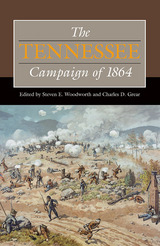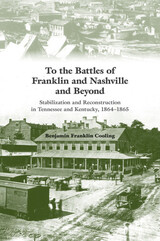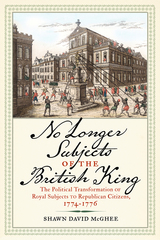
Though Hood managed to cut communication between Sherman and George H. Thomas’s Union forces by placing his troops across the railroads south of the city, Hood’s men were spread over a wide area and much of the Confederate cavalry was in Murfreesboro. Hood’s army was ultimately routed. Union forces pursued the Confederate troops for ten days until they recrossed the Tennessee River. The decimated Army of Tennessee (now numbering only about 15,000) retreated into northern Alabama and eventually Mississippi. Hood requested to be relieved of his command. Less than four months later, the war was over.
Written in a lively and engaging style, Nashville presents new interpretations of the critical issues of the battle. James Lee McDonough sheds light on how the Union army stole past the Confederate forces at Spring Hill and their subsequent clash, which left six Confederate generals dead. He offers insightful analysis of John Bell Hood’s overconfidence in his position and of the leadership and decision-making skills of principal players such as Sherman, George Henry Thomas, John M. Schofield, Hood, and others.
Within the pages of Nashville, McDonough’s subjects, both common soldiers and officers, present their unforgettable stories in their own words. Unlike most earlier studies of the battle of Nashville, McDonough’s account examines the contributions of black Union regiments and gives a detailed account of the battle itself as well as its place in the overall military campaign. Filled with new information from important primary sources and fresh insights, Nashville will become the definitive treatment of a crucial battleground of the Civil War.
James Lee McDonough is retired professor of history from Auburn University. He is the author of numerous books on the Civil War, including Shiloh—In Hell Before Night, Chattanooga—Death Grip on the Confederacy, and War in Kentucky: From Shiloh to Perryville.

Contributors explore the campaign’s battlefield action, including how Major General Andrew J. Smith’s three aggressive divisions of the Army of Tennessee became the most successful Federal unit at Nashville, how vastly outnumbered Union troops held the Allatoona Pass, why Hood failed at Spring Hill and how the event has been perceived, and why so many of the Army of Tennessee’s officer corps died at the Battle of Franklin, where the Confederacy suffered a disastrous blow. An exciting inclusion is the diary of Confederate major general Patrick R. Cleburne, which covers the first phase of the campaign. Essays on the strained relationship between Ulysses S. Grant and George H. Thomas and on Thomas’s approach to warfare reveal much about the personalities involved, and chapters about civilians in the campaign’s path and those miles away show how the war affected people not involved in the fighting. An innovative case study of the fighting at Franklin investigates the emotional and psychological impact of killing on the battlefield, and other implications of the campaign include how the courageous actions of the U.S. Colored Troops at Nashville made a lasting impact on the African American community and how preservation efforts met with differing results at Franklin and Nashville.
Canvassing both military and social history, this well-researched volume offers new, illuminating perspectives while furthering long-running debates on more familiar topics. These in-depth essays provide an expert appraisal of one of the most brutal and notorious campaigns in Civil War history.

“Benjamin Franklin Cooling has produced a triumphant third volume to his definitive study of Tennessee and Kentucky in the Civil War. Like his first two volumes, this one perfectly integrates the home front and battlefield, demonstrating that civilians were continually embroiled in the war in intense ways comparable to and often surpassing the violence experienced by soldiers on the battlefield. The impacts of armies, guerrillas, and other military forces on civilians was continual, terrifying, and brutal in nearly all parts of the Confederacy’s Heartland.” —T. Michael Parrish, Linden G. Bowers Professor of American History, Baylor University
“Cooling’s scholarship is indeed sound and based on extensive research in a variety of original sources that range from manuscript collections to newspapers, with an exhaustive list of secondary sources. His work represents the first new interpretations of this important part of the war in decades.” —Archie P. McDonald, Regent’s Professor and Community Liaison, Stephen F. Austin State University
In two preceding volumes, Forts Henry and Donelson and Fort Donelson’s Legacy, Benjamin Franklin Cooling offered a sweeping portrayal of war and society in the upper southern heartland of Kentucky and Tennessee during the first two and a half years of the Civil War. This book continues that saga as Cooling probes the profound turmoil—on the battlefield, on the home front, within the shadow areas where lawlessness reigned—that defined the war in the region as it ground to its close.
By 1864 neither the Union’s survival nor the South’s independence was any more apparent than at the beginning of the war. The grand strategies of both sides were still evolving, and Tennessee and Kentucky were often at the cusp of that work. With his customary command of myriad sources, Cooling examines the heartland conflict in all its aspects: the Confederate cavalry raids and Union counteroffensives; the harsh and punitive Reconstruction policies that were met with banditry and brutal guerrilla actions; the disparate political, economic, and sociocultural upheavals; the ever-growing war weariness of the divided populations; and the climactic battles of Franklin and Nashville that ended the Confederacy’s hopes in the Western Theater. Especially notable in this volume is Cooling’s use of the latest concepts of “hybrid” or “compound war” that national security experts have applied to the twenty-first-century wars in Iraq and Afghanistan—a mode of analysis that explores how catastrophic terrorism and disruptive lawlessness mix with traditional combat and irregular operations to form a new kind of warfare. Not only are such concepts relevant to the historical study of the Civil War in the heartland, Cooling suggests, but by the same token, their illumination of historical events can only enrich the ways in which policymakers view present-day conflicts.
In chronicling Tennessee and Kentucky’s final rite of passage from war to peace, To the Battles of Franklin and Nashville and Beyond is in every way a major contribution to Civil War literature by a masterful historian.
READERS
Browse our collection.
PUBLISHERS
See BiblioVault's publisher services.
STUDENT SERVICES
Files for college accessibility offices.
UChicago Accessibility Resources
home | accessibility | search | about | contact us
BiblioVault ® 2001 - 2024
The University of Chicago Press









